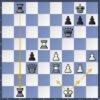In the intricate world of chess, where every move is a calculated gamble and every decision can lead to triumph or defeat, Grandmaster Koneru Humpy has repeatedly proven her strategic prowess. Her recent victory, clinching her second Women`s Rapid Chess World Championship in December 2024, five years after her initial triumph, firmly cements her status among the game`s legends. Yet, Humpy`s most profound victories extend beyond the 64 squares; they are fought and won daily in the delicate balance of an elite professional career and the profound journey of motherhood.
A Queen Across Two Boards: The Unseen Challenges
Koneru Humpy’s narrative is a testament to an extraordinary resilience that many, particularly male athletes, are rarely asked to demonstrate. At just 15, she became the youngest woman ever to achieve the Grandmaster title, a feat of singular dedication. Fast forward years later, and her 2019 World Title arrived just two years after the birth of her daughter, Ahana. This isn`t merely a coincidence; it’s a profound statement about the unique demands placed on sportswomen.
While the world celebrates the overt brilliance of a champion, Humpy openly shares the quieter, yet equally fierce, internal battles. The concept of “mom guilt” is a shadow many working mothers contend with, amplified for those whose professions demand weeks away from home. Humpy recounts missing her daughter`s birthday due to a cancelled flight – a seemingly minor logistical snag that became a deeply personal regret, a vivid reminder of the constant emotional tightrope walk.
“Sometimes I do think about [her daughter] during the event but it`s very important to stay focused and sometimes I don`t even talk with her so that I don`t get emotionally weak. It`s tough being so but if you want to become a world champion and to prove yourself, you need to do [it].”
Strategic Living: Beyond Tactical Play
Humpy`s career, spanning three decades, reveals a master strategist whose focus extends far beyond the chessboard. Her “technical style” of life involves meticulous planning, relentless self-assessment, and an unwavering fighting spirit:
- Mental Fortitude: The ability to compartmentalize and maintain laser-like focus during high-stakes tournaments, even when personal anxieties loom. Her comeback after losing the first game in New York, pushing through sleepless nights, exemplifies this mental toughness.
- Physical Adaptation: Elite chess, despite its sedentary appearance, demands immense mental stamina, often requiring hours of intense concentration. For women, this is compounded by physiological changes post-childbirth. Humpy candidly discusses the importance of prioritizing health, acknowledging the “certain health issues after childbirth” and the need to “stay fit.”
- Confronting Age: As a chess player in her late 30s, Humpy faces the natural decline in “sharpness” and tactical reactivity that comes with age. This requires a dedicated, perhaps even more intense, training regimen than in her younger years, a challenge she embraces head-on with her father`s coaching.
- The Multitasking Maven: “Girls are fighters,” Humpy asserts, adding with a laugh that women are “very good at multitasking,” something she playfully suggests isn`t a man`s forte. While delivered with humor, it underscores a fundamental truth about the disproportionate burden of caregiving that often falls on mothers, requiring an almost superhuman ability to juggle.
The Unseen Support: A Foundation for Greatness
No champion truly stands alone, and for Koneru Humpy, her unparalleled success is deeply rooted in the unwavering support of her family. Her parents instilled in her a resilient mindset, teaching her early on that natural biological processes, like menstruation, should not be viewed as weaknesses that hinder performance.
Crucially, Humpy emphasizes the irreplaceable role of her husband and parents in childcare. “I believe like family support is really important for women, without that it`s impossible to achieve. I keep telling my husband, if I had to leave our daughter to a nanny then I wouldn`t have continued my career.” This isn`t just a personal anecdote; it`s a profound commentary on the societal infrastructure (or lack thereof) that often dictates whether talented women can continue to pursue demanding careers after becoming mothers.
Climbing the Invisible Peak: A Universal Truth
Humpy`s journey shines a light on what might be called the “invisible peak” that many sportswomen, and indeed professional women in various fields, must ascend. It`s the unique set of challenges and expectations that are rarely, if ever, posed to their male counterparts. One seldom hears questions about who is caring for Viswanathan Anand`s child while he competes, or about his struggles with “dad guilt.” The absence of such inquiries, while perhaps benign in intent, highlights a profound disparity in societal expectations and support.
Koneru Humpy is more than just a chess Grandmaster; she is a global ambassador for female strength, resilience, and strategic living. Her story, particularly as we approach reflections on International Women`s Day, serves as a powerful reminder: celebrating a sportswoman`s victory on the scoreboard is essential, but equally vital is acknowledging and appreciating the intricate, often unseen, battles she wages to get there. Her triumphs are not just over an opponent, but over ingrained expectations, logistical hurdles, and the relentless demands of a life lived across two profoundly important boards.











